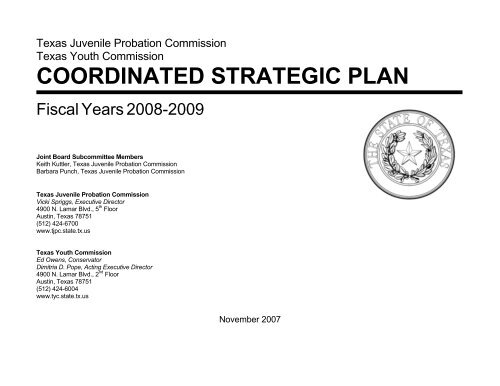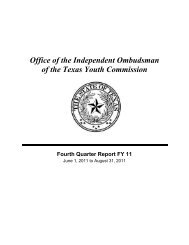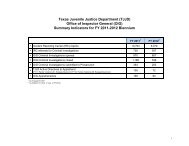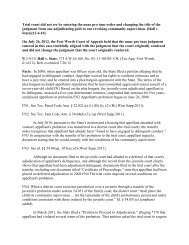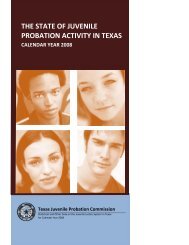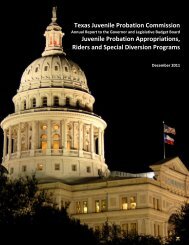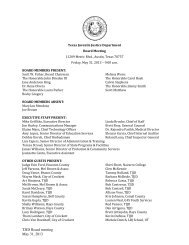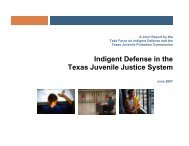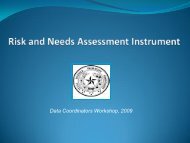coordinated strategic plan - Texas Juvenile Justice Department
coordinated strategic plan - Texas Juvenile Justice Department
coordinated strategic plan - Texas Juvenile Justice Department
Create successful ePaper yourself
Turn your PDF publications into a flip-book with our unique Google optimized e-Paper software.
<strong>Texas</strong> <strong>Juvenile</strong> Probation Commission<br />
<strong>Texas</strong> Youth Commission<br />
COORDINATED STRATEGIC PLAN<br />
Fiscal Years 2008-2009<br />
Joint Board Subcommittee Members<br />
Keith Kuttler, <strong>Texas</strong> <strong>Juvenile</strong> Probation Commission<br />
Barbara Punch, <strong>Texas</strong> <strong>Juvenile</strong> Probation Commission<br />
<strong>Texas</strong> <strong>Juvenile</strong> Probation Commission<br />
Vicki Spriggs, Executive Director<br />
4900 N. Lamar Blvd., 5 th Floor<br />
Austin, <strong>Texas</strong> 78751<br />
(512) 424-6700<br />
www.tjpc.state.tx.us<br />
<strong>Texas</strong> Youth Commission<br />
Ed Owens, Conservator<br />
Dimitria D. Pope, Acting Executive Director<br />
4900 N. Lamar Blvd., 2 nd Floor<br />
Austin, <strong>Texas</strong> 78751<br />
(512) 424-6004<br />
www.tyc.state.tx.us<br />
November 2007
Board Members<br />
<strong>Texas</strong> <strong>Juvenile</strong><br />
Probation Commission<br />
Cheryl Lee Shannon, Dallas<br />
Chairperson<br />
Jean Boyd, Fort Worth<br />
Vice-Chairperson<br />
Bob “Ed” Culver, Canadian<br />
Keith Kuttler, Bryan<br />
Ray West, Brownwood<br />
Lea R. Wright, Amarillo<br />
Barbara Punch, Missouri City<br />
Rene Ordonez, El Paso<br />
<br />
<strong>Texas</strong> Youth Commission<br />
Edward Owens, Conservator<br />
Dimitria D. Pope,<br />
Acting Executive Director<br />
<br />
Joint Board<br />
Subcommittee Members<br />
Keith Kuttler, TJPC<br />
Barbara Punch, TJPC<br />
Vacant, TYC<br />
Vacant, TYC<br />
Vacant, TYC<br />
<strong>Texas</strong> <strong>Juvenile</strong> Probation Commission and <strong>Texas</strong> Youth Commission<br />
COORDINATED STRATEGIC PLAN<br />
Fiscal Years 2008 - 2009<br />
Vicki Spriggs, Executive Director<br />
<strong>Texas</strong> <strong>Juvenile</strong> Probation Commission<br />
4900 North Lamar Boulevard, 5 th Floor East<br />
P.O. Box 13547<br />
Austin, <strong>Texas</strong> 78711<br />
Main (512) 424-6700<br />
Fax (512) 424-6717<br />
TDD (512) 483-4000<br />
www.tjpc.state.tx.us<br />
<br />
Approved November 2007<br />
Dimitria D. Pope, Acting Executive Director<br />
<strong>Texas</strong> Youth Commission<br />
4900 North Lamar Boulevard, 2 nd Floor<br />
P.O. Box 4260<br />
Austin, <strong>Texas</strong> 78765<br />
Main (512) 424-6004<br />
Fax (512) 424-6099<br />
TDD (512) 483-4000<br />
www.tyc.state.tx.us<br />
Signed: __________________________________ ___________________________________<br />
Vicki Spriggs, Executive Director<br />
Dimitria D. Pope, Executive Director<br />
<strong>Texas</strong> <strong>Juvenile</strong> Probation Commission <strong>Texas</strong> Youth Commission<br />
Approved: ___________________________________<br />
Cheryl Shannon, Board Chair<br />
<strong>Texas</strong> <strong>Juvenile</strong> Probation Commission<br />
___________________________________<br />
Edward Owens, Conservator<br />
<strong>Texas</strong> Youth Commission<br />
The <strong>Texas</strong> <strong>Juvenile</strong> Probation Commission and <strong>Texas</strong> Youth Commission, equal opportunity employers, do not discriminate on the basis of race, color, national origin,<br />
sex, religion, age or disability in employment or the provision of services, programs or activities. In compliance with the Americans with Disabilities Act, this document<br />
may be requested in alternative formats by contacting the <strong>Texas</strong> <strong>Juvenile</strong> Probation Commission or <strong>Texas</strong> Youth Commission at the above address.
T A B L E O F C O N T E N T S<br />
Mission Statement ....................................................................................................................................................1<br />
Introduction<br />
Background .......................................................................................................................................................1<br />
Overview of the <strong>Juvenile</strong> <strong>Justice</strong> System.........................................................................................................1<br />
<strong>Juvenile</strong> <strong>Justice</strong> Legislation ..............................................................................................................................2<br />
2008-2009 Appropriation.........................................................................................................................2<br />
Appropriation Impact on the <strong>Texas</strong> <strong>Juvenile</strong> Probation Commission.........................................2<br />
Appropriation Impact on the <strong>Texas</strong> Youth Commission..............................................................3<br />
Legislation Impacting the <strong>Juvenile</strong> <strong>Justice</strong> System................................................................................4<br />
Goals and Strategies<br />
Methodology....................................................................................................................................................10<br />
Goals and Strategies.......................................................................................................................................10<br />
Additional Information<br />
Supervision and Community Aftercare Services and Programs...................................................................11<br />
Intensive Supervision Programs.....................................................................................................................12<br />
Evaluation of <strong>Juvenile</strong> <strong>Justice</strong> Services .........................................................................................................13<br />
Productivity ......................................................................................................................................................13<br />
Recidivism .......................................................................................................................................................13<br />
Criteria to Reduce Over-Representation of Minority Youth ...........................................................................15<br />
Population Projections and Characteristics....................................................................................................15<br />
Cross-Agency Performance Measures ..........................................................................................................15<br />
Conclusion: Program, Resources and Capacity Needs...................................................................................16<br />
Coordinated Strategic Plan Steering Committee, Fiscal Years 2008-2009 ....................................................16
<strong>Texas</strong> <strong>Juvenile</strong> Probation Commission and <strong>Texas</strong> Youth Commission<br />
MISSION STATEMENT<br />
The <strong>Texas</strong> <strong>Juvenile</strong> Probation Commission (TJPC) and the <strong>Texas</strong> Youth<br />
Commission (TYC) are committed to achieving a state and local<br />
partnership that ensures a comprehensive and <strong>coordinated</strong> juvenile<br />
justice system, which provides public protection and rehabilitation of<br />
youth – balancing treatment and accountability, and delinquency<br />
prevention.<br />
INTRODUCTION<br />
Background<br />
TJPC and TYC are charged with developing a <strong>coordinated</strong> <strong>strategic</strong> <strong>plan</strong><br />
for juvenile justice in <strong>Texas</strong> (see Tex. Hum. Res. Code Ann., §61.0911<br />
and §141.0471). The two state agencies play a major role in the<br />
organization and implementation of juvenile justice services within the<br />
state and are integral to a system that partners numerous local<br />
government, state government and private entities.<br />
This is the seventh biennial Coordinated Strategic Plan produced jointly<br />
by TJPC and TYC since 1995. The <strong>plan</strong> focuses on comprehensive<br />
strategies relative to coordinating data; developing alternative resource<br />
initiatives; coordinating training; enhancing the involvement of families<br />
and communities in the juvenile justice system; informing juvenile court<br />
judges, prosecutors and juvenile law enforcement; and exploring<br />
opportunities to increase services to youth with behavioral disorders<br />
involved in the juvenile justice system.<br />
Overview of the <strong>Juvenile</strong> <strong>Justice</strong> System<br />
Youth served in the juvenile justice system have been adjudicated for<br />
an offense(s) committed between their tenth and seventeenth<br />
birthday.<br />
The juvenile justice system has several components. <strong>Juvenile</strong> justice<br />
stake-holders at the local level include law enforcement, prosecutors,<br />
juvenile courts, juvenile boards, county juvenile probation departments,<br />
school districts, governmental or private service providers, victims and<br />
families of juvenile offenders and the general public. Local probation<br />
services are administered through local juvenile boards, which are<br />
funded with county and state dollars.<br />
TJPC works in partnership with local juvenile boards and juvenile<br />
probation departments to support and enhance juvenile probation<br />
services throughout the state by: 1) providing funding, technical<br />
assistance, and training; 2) establishing and enforcing standards; 3)<br />
collecting, analyzing and disseminating information; and 4) facilitating<br />
communications between state and local entities. TJPC also provides<br />
juvenile probation departments with alternatives to TYC commitment<br />
through targeted residential placement and special program funding.<br />
TYC is directly responsible for administering the state’s juvenile<br />
correctional facilities, parole programs, and related community-based<br />
services for youth who are committed to the custody and care of the<br />
state. In addition to providing services and a safe environment for youth<br />
committed to its custody, the agency operates divisions for training,<br />
monitoring, research, treatment, education, nursing, counseling, and job<br />
certification.<br />
Coordinated Strategic Plan Fiscal Years 2008 – 2009<br />
November 2007 Page 1
<strong>Texas</strong> <strong>Juvenile</strong> Probation Commission and <strong>Texas</strong> Youth Commission<br />
The following other state agencies provide services to the delinquent<br />
and pre-delinquent youth of the state.<br />
- The <strong>Texas</strong> <strong>Department</strong> of Family and Protective Services (DFPS)<br />
manages community-based programs that prevent delinquency,<br />
abuse, neglect and exploitation of <strong>Texas</strong> children, and investigates<br />
reports of abuse and neglect of children.<br />
- The <strong>Texas</strong> <strong>Department</strong> of State Health Services (DSHS) provides<br />
an array of health services to children and their families through<br />
services that focus on preventing disease, protecting health, and<br />
promoting safe and healthy living. The scope and function of DSHS<br />
services include policy areas such as mental health, public health, as<br />
well as alcohol and drug abuse services.<br />
- The <strong>Texas</strong> Education Agency (TEA) coordinates public education<br />
policy and is an educational services resource for school districts<br />
with children who are either involved in the juvenile justice system<br />
or who are considered at-risk for becoming involved.<br />
- The <strong>Texas</strong> <strong>Department</strong> of Public Safety (DPS) is charged with<br />
operating a statewide, computerized juvenile justice information<br />
system and a statewide registry of juvenile sex offenders. DPS also<br />
supports a <strong>Texas</strong> Violent Gang Task Force to proactively track gang<br />
activity and the growth and spread of gangs statewide.<br />
Representatives from various state agencies, including TJPC and<br />
TYC, and local law enforcement make up the task force.<br />
- The Attorney General's <strong>Juvenile</strong> Crime Intervention Division<br />
(JCI) is charged with maintaining the Gang Resource System, a<br />
secure web site that provides general gang information to criminal<br />
and justice agency personnel. JCI also provides training on a wide<br />
variety of juvenile issues including: gang awareness and trends;<br />
gang recruitment and activity on the internet; hate and white<br />
supremacy groups; as well as legal programs such as search and<br />
seizure, crimes in school and juvenile confessions.<br />
- The <strong>Texas</strong> <strong>Department</strong> of Criminal <strong>Justice</strong> (TDCJ) also plays a<br />
role in the juvenile justice system because of the determinate<br />
sentenced juveniles transferred to TDCJ’s Institutional Division<br />
from TYC facilities or placed on adult parole.<br />
<strong>Juvenile</strong> <strong>Justice</strong> Legislation, 80th <strong>Texas</strong> Legislature, Regular Session<br />
2008-2009 Appropriations<br />
Appropriation Impact on the <strong>Texas</strong> <strong>Juvenile</strong> Probation Commission<br />
The amount biennially appropriated by the Legislature for the Basic<br />
Probation Goal was $95,123,084. The Community Corrections<br />
Services Strategy was increased by $57,893,170. A portion of this<br />
amount, $22,536,670, will be utilized by local juvenile probation<br />
departments for enhanced community-based services and programs.<br />
The remaining amount of $35,356,500 is designated for local juvenile<br />
probation departments to place youth in secure or non-secure<br />
residential facilities as a diversion from commitment to TYC. There<br />
were no changes to the remaining strategies within the Community<br />
Corrections Goal over the biennium which was initially designated for<br />
the 10% budget reduction required by each state agency. This<br />
included funding for Harris County Boot Camp ($2,000,000); Level 5<br />
Post-Adjudication Facilities ($8,788,872); Local Post-Adjudication<br />
Facilities ($8,294,076); and the Special Needs Diversionary Programs<br />
($3,948,068).<br />
Coordinated Strategic Plan Fiscal Years 2008 – 2009<br />
November 2007 Page 2
<strong>Texas</strong> <strong>Juvenile</strong> Probation Commission and <strong>Texas</strong> Youth Commission<br />
The Legislature approved an increase of five additional staff members<br />
(FTEs) for TJPC and the funding for these FTEs was added to the<br />
Probation Assistance Goal. These positions include one mental<br />
health professional to assist juvenile probation departments in<br />
developing services for mentally ill offenders; one staff attorney to<br />
coordinate and respond to public information requests and assist with<br />
disciplinary/administrative hearings; one abuse, neglect and<br />
exploitation investigator; and two administrative assistants to assist<br />
with public information requests and abuse, neglect and exploitation<br />
investigations. TJPC also received additional funds of $25,000 for<br />
one vehicle and $71,096 for replacement of computer equipment. The<br />
Legislature authorized TJPC in the Probation Assistance Goal to<br />
recoup $56,066,840 in federal Title IV-E funds to reimburse counties<br />
for qualifying foster care services. It should be noted that federal<br />
funds decreased from the previous biennium due to changes in<br />
federal regulations.JJAEP funding was increased by $5,853,556 over<br />
the current biennial amount of $17,139,096. This increase reflects the<br />
projected increase in mandatory student attendance days and the<br />
increased daily reimbursement rate from $59 to $79 per mandatory<br />
attendance day. The rate increase is intended to address the cost of<br />
providing educational services for these mandatory students. There<br />
were no funding increases to the Indirect Administration Goal; the<br />
amount remained at $2,153,602.<br />
Appropriation Impact on the <strong>Texas</strong> Youth Commission<br />
The <strong>Texas</strong> Youth Commission received biennial appropriations for<br />
2008-2009 of approximately $489 million and authority for a maximum<br />
of 4,263 full-time employees (FTEs) each year, compared to 4,860<br />
FTEs in fiscal year 2006.<br />
Youth populations, both general and specialized treatment, continue<br />
to be the most significant drivers of the agency’s budget. The<br />
passage of Senate Bill 103 is expected to reduce the agency’s<br />
populations by eliminating misdemeanor commitments to TYC. In<br />
addition, all current misdemeanor and felony commitments must be<br />
discharged or transferred to the adult system on or before the youth’s<br />
19 th birthday.<br />
The 2008 operating budget represents a 27% decrease in residential<br />
populations. The “average daily population” during fiscal year 2007<br />
was 4,305, a reduction of about 600 youth for the year. This year’s<br />
reduction was largely a result of the early transfer of two TYC units,<br />
the Marlin Orientation and Assessment Unit and the John Shero<br />
<strong>Juvenile</strong> Correctional Facility, to TDCJ. Rider 24 of the agency’s bill<br />
pattern transferred the Marlin Orientation and Assessment Unit and<br />
the John Shero <strong>Juvenile</strong> Correctional Facility to TDCJ no later than<br />
March 1, 2008, for a total of 792 beds. An additional 704 beds to be<br />
closed will be identified through the agency’s vulnerability<br />
assessment, accreditation process, and staffing assessments. In<br />
addition, 456 beds were reduced due to the remodeling of the open<br />
bay 96 bed dorms to single cell dorms. The Contracted Capacity<br />
Strategy is budgeted for an average population of 641, an increase<br />
from the actual average daily population of 438 in fiscal year 2007.<br />
Funding was increased for contract beds due to the reduction in<br />
institutional capacity.<br />
New funding was approved for several exceptional appropriation<br />
requests to comply with SB 103: $28.9 million for 516 <strong>Juvenile</strong><br />
Correction Officers to achieve a 1:12 staff to youth ratio, $1.4 million<br />
for 13 FTEs to meet the 300 hour training requirement, $1.6 million for<br />
16 FTEs to establish the Office of Inspector General, and $.25 million<br />
for 3 FTEs for the additional Internal Audit requirements.<br />
Coordinated Strategic Plan Fiscal Years 2008 – 2009<br />
November 2007 Page 3
<strong>Texas</strong> <strong>Juvenile</strong> Probation Commission and <strong>Texas</strong> Youth Commission<br />
The Youth Commission received $20 million in the HB 15<br />
Supplemental Appropriations Act. The supplemental appropriations<br />
funded $18 million for video surveillance equipment and $2 million for<br />
other agency rehabilitation initiatives. HB 15 also appropriated<br />
$977,500 for making payments for data center services and hardware<br />
upgrades.<br />
The agency received additional appropriations in Article IX of the<br />
General Appropriations Act. TYC was appropriated $57.7 million in<br />
general obligation bonds for the repair and rehabilitation on existing<br />
facilities and remodel of open bay dorms and for the new construction<br />
at existing facilities and to construct one new facility in a major<br />
metropolitan area. Appropriations were also received in Article IX to<br />
implement provisions of SB 103: $.2 million for the reimbursement of<br />
counties for the prosecution of criminal offenses committed at TYC<br />
facilities and $2 million for 19 FTEs to establish minimum length of<br />
stay review panels. TYC received a contingency appropriation of $2<br />
million for <strong>Juvenile</strong> Sex Offender Treatment.<br />
Legislation Impacting the <strong>Juvenile</strong> <strong>Justice</strong> System<br />
HB 2884 by Representative Harold Dutton, the omnibus juvenile<br />
justice bill, contains substantive improvements to the <strong>Juvenile</strong> <strong>Justice</strong><br />
Code in addition to refinements to existing juvenile law and procedure.<br />
The amendments in HB 2884 reflect the changing needs of a juvenile<br />
justice system that has increased in size, sophistication and<br />
complexity since the major reforms of the 74 th Legislature in 1995.<br />
The bill refines the Inter-County Transfer provisions in the Family<br />
Code, provides detailed procedure for the processing of restitution<br />
payments for local probation departments, gives TJPC subpoena<br />
power, requires juvenile judges to post on their website the number of<br />
TYC commitments and other child/offense data, strengthens current<br />
law to protect youth in residential settings, enhances public safety<br />
relative to juvenile offenders, and holds all juvenile justice agencies<br />
more accountable for providing quality services. The bill provides for<br />
juvenile justice reform in the following areas:<br />
Strengthening Current Law to Protect Youth in the<br />
<strong>Juvenile</strong> <strong>Justice</strong> System Placed in Residential Treatment<br />
and Correctional Facilities.<br />
Clarifies a residential placement of a child as a condition of<br />
juvenile probation must be into a facility licensed by a state<br />
governmental entity or exempted by law from licensure.<br />
Adds the employees of the <strong>Texas</strong> Youth Commission and<br />
local juvenile probation departments (e.g., juvenile<br />
probation, detention, correctional and parole officers) to<br />
the list of those professionals who are prohibited from<br />
having sexual activity with persons under the jurisdiction of<br />
but not in the custody of their employing entity.<br />
Includes secure juvenile pre-adjudication detention and<br />
post-adjudication correctional facilities in the following<br />
Penal Code offenses committed by staff in these facilities.<br />
[Sections 39, 40, and 42]<br />
- Permitting or Facilitating Escape (Penal Code Section<br />
38.07)<br />
- Implements for Escape (Penal Code Section 38.09)<br />
- Contraband in Correctional Facility (Penal Code<br />
Section 38.114)<br />
Enhancing Public Safety Related to <strong>Juvenile</strong> Offenders<br />
Expands the Determinate Sentencing Act provisions to<br />
include the offense of criminal conspiracy to commit any of<br />
the enumerated determinate sentence offenses. (<strong>Texas</strong><br />
Family Code Section 53.045) [Section 10]<br />
Coordinated Strategic Plan Fiscal Years 2008 – 2009<br />
November 2007 Page 4
<strong>Texas</strong> <strong>Juvenile</strong> Probation Commission and <strong>Texas</strong> Youth Commission<br />
Expands the Penal Code offense of Escape (Penal Code<br />
38.06) to include escape by a juvenile from a secure<br />
juvenile pre-adjudication detention facility and escape from<br />
the lawful custody of a juvenile probation officer. [Section<br />
38]<br />
Includes all secure juvenile pre-adjudication detention and<br />
post-adjudication correctional facilities in the following<br />
Penal Code offense that may be committed by juvenile<br />
offenders [Section 41]:<br />
- Improper Contact with Victim (Penal Code 38.111)<br />
Requires mental health facilities to seek juvenile court<br />
permission before releasing a juvenile who has committed<br />
a “3g” offense on furlough for more than 48 hours.<br />
[Section 15]<br />
Strengthening the Ability of the <strong>Texas</strong> <strong>Juvenile</strong> Probation<br />
Commission to Investigate Allegations of Abuse, Neglect<br />
and Exploitation in <strong>Juvenile</strong> <strong>Justice</strong> Facilities and<br />
Programs<br />
Allows the <strong>Texas</strong> <strong>Juvenile</strong> Probation Commission to<br />
employ and commission investigators as peace officers for<br />
the purpose of investigating allegations of abuse, neglect,<br />
and exploitation in juvenile justice programs and facilities.<br />
[Section 1]<br />
Clarifies the definitions of abuse, neglect and exploitation<br />
to reinforce that the <strong>Texas</strong> <strong>Juvenile</strong> Probation Commission<br />
has investigative authority in all juvenile justice programs<br />
and facilities. [Sections 29, 30]<br />
Provides TJPC with a necessary investigative tool of<br />
subpoena power. It allows the commission board to issue<br />
a subpoena for the investigation of abuse, neglect, or<br />
exploitation, during fiscal and programmatic audits, and to<br />
discharge the agency’s statutory duties and mandates.<br />
[Section 33]<br />
Expanding Information Sharing Procedures between<br />
<strong>Juvenile</strong> <strong>Justice</strong> Agencies and Other Authorized Entities<br />
to Facilitate More Effective Assessment, Treatment and<br />
Rehabilitation of <strong>Juvenile</strong> Offenders<br />
Authorizes the <strong>Texas</strong> <strong>Juvenile</strong> Probation Commission, via<br />
an interagency agreement, to share information for<br />
research, audit and analytical purposes with TEA, TYC<br />
and TDCJ. [Sections 16, 18]<br />
Clarifies that law enforcement records may be sent to<br />
regional and statewide repositories such as the JIS<br />
System in the Dallas region and the new statewide JCMS<br />
Project. [Section 17]<br />
Expands the local justice information systems (JIS) to<br />
include prosecutors and court clerks. Recognizes the use<br />
of electronic filing of court documents with electronic<br />
signatures. [Sections 20, 21, 22, and 23]<br />
Provides statutory authorization for a statewide juvenile<br />
information and case management system. The JCMS<br />
project, a collaborative effort between the Conference of<br />
Urban Counties, Bexar County, Dallas County, Tarrant<br />
County and the <strong>Texas</strong> <strong>Juvenile</strong> Probation Commission, is<br />
a unique state/local partnership to create a state of the art<br />
technology system for use by <strong>Texas</strong> juvenile probation<br />
departments. By sharing design and development costs,<br />
the participating entities are leveraging state and local<br />
resources to create an innovative and effective technology<br />
solution which will facilitate information sharing by juvenile<br />
justice entities statewide. [Section 27]<br />
Coordinated Strategic Plan Fiscal Years 2008 – 2009<br />
November 2007 Page 5
<strong>Texas</strong> <strong>Juvenile</strong> Probation Commission and <strong>Texas</strong> Youth Commission<br />
Requiring the Urban Counties to Post Numbers of TYC<br />
Commitments on County Websites [Section 26]<br />
Applies to counties with a population of 600,000 or more:<br />
- Per 2000 Census, these 6 counties are Harris,<br />
Bexar, Travis, Dallas, Tarrant, and El Paso.<br />
<strong>Juvenile</strong> court judge must post on the county’s internet<br />
website the total number of TYC commitments including a<br />
description of the offense, the age range, race and gender<br />
of the child.<br />
Posting required quarterly.<br />
No posted information may identify the child.<br />
Expanding the Infant Care and Parenting Programs at the<br />
<strong>Texas</strong> Youth Commission [Section 32]<br />
Expands the <strong>Texas</strong> Youth Commission’s parenting<br />
program to include a parenting aftercare independent<br />
living component. The independent living component<br />
would apply to mothers who are at least age 18. The<br />
mother must obtain qualified day-care, enroll in all<br />
applicable federal and state assistance programs<br />
(Medicaid and WIC), apply for child support through the<br />
Office of the Attorney General, obtain employment within<br />
30 days, pass drug tests, have no roommates, have an<br />
assigned mentor, and develop an Individual Case Plan<br />
(ICP) that addresses contingencies (abandonment of the<br />
child or parole or independent living program violations).<br />
Making Refinements and Improvements to the Inter-<br />
County Transfer of Probation Supervision Procedures<br />
In 2005, HB 1575 (by Dutton) enacted a new and<br />
comprehensive procedure known as Inter-County Transfer<br />
of Probation Supervision to ensure probationers moving<br />
between counties were provided effective and continuing<br />
probation supervision.<br />
HB 2884 makes several refinements to these procedures<br />
which were suggested by a collaborative working group of<br />
juvenile probation departments. [Sections 5, 6, and 7]<br />
- Requires Sending County and Receiving County to<br />
agree on start date of interim supervision which<br />
must begin within 3 days of when documents are<br />
received and accepted.<br />
- Requires Sending County to provide Receiving<br />
County with additional information about the child<br />
in a timely manner.<br />
- Counties in the same judicial district served by<br />
same juvenile probation department do not have to<br />
transfer cases between counties.<br />
- Clarifies the collection and distribution of victim<br />
restitution payments between Sending County and<br />
Receiving County.<br />
- Clarifies the transfer provisions for youth on<br />
determinate sentence probation.<br />
Providing a Detailed Procedure for <strong>Juvenile</strong> Probation<br />
<strong>Department</strong>s to Handle Victim Restitution Payments<br />
[Section 12]<br />
After notification of receipt of restitution payments by the<br />
juvenile probation department, the victims have 5 years to<br />
claim the restitution payments.<br />
Authorizes juvenile probation departments to expend<br />
unclaimed funds in the juvenile restitution fund for same<br />
purposes for which the county may spend state aid funds.<br />
Probation department retains any interest earned on<br />
restitution account.<br />
Coordinated Strategic Plan Fiscal Years 2008 – 2009<br />
November 2007 Page 6
<strong>Texas</strong> <strong>Juvenile</strong> Probation Commission and <strong>Texas</strong> Youth Commission<br />
Providing a Number of Technical Amendments, Corrections<br />
and Clarifications and Substantive Changes to Current Law<br />
in a Variety of Areas<br />
Prohibits justice and municipal courts from ordering a child<br />
to attend the juvenile justice alternative education program<br />
(JJAEP). [Section 2]<br />
Expands juvenile court jurisdiction in a motion to transfer<br />
determinate sentence probation to adult court for a<br />
juvenile age 18 or older who has fled the jurisdiction<br />
before a transfer hearing can be held if the motion for<br />
transfer has been timely filed prior to the juvenile<br />
becoming 18. Additionally, the prosecutor must<br />
demonstrate due diligence to complete the transfer<br />
proceeding prior to the probationer’s 18th birthday for<br />
probation to be transferred. [Section 4]<br />
Authorizes the use of digital recording mediums for<br />
magistrate’s warnings. [Section 8]<br />
Makes certain Code of Criminal Procedure rules<br />
applicable to juvenile proceedings as it relates to using a<br />
pseudonym by a victim, using unadjudicated conduct at<br />
disposition hearings, and the voluntary absence of a<br />
juvenile from a proceeding. [Section 9]<br />
Waives trial and appellate court fees for the State except<br />
in determinate sentence appeals. [Section 9]<br />
Explicitly authorizes detention of a juvenile post-disposition<br />
pending transport to a court-ordered placement, a <strong>Texas</strong><br />
Youth Commission facility, or while accessing medical<br />
care purposes. [Section 11]<br />
Authorizes fingerprint cards to be attached to juvenile<br />
court adjudication orders for digital fingerprint imaging<br />
systems. [Section 11]<br />
Requires juvenile to elect jury in disposition hearing in<br />
writing prior to voir dire of jury panel. [Section 11]<br />
Authorizes the fingerprint records of non-custodial juvenile<br />
referrals to be forwarded to <strong>Department</strong> of Public Safety<br />
within 30 days instead of the 7 day requirement for<br />
custodial referrals. [Section 19]<br />
Recognizing the serious dangers of juvenile inhalant<br />
abuse, the bill elevates inhalant abuse to Level Two of<br />
Progressive Sanctions Guidelines to encourage higher<br />
level of intervention, programs and services. [Section 28]<br />
Clarifies that school districts must file a complaint for<br />
failure to attend school within 7 days of the child’s 10th<br />
absence. [Note that HB 1161 extends the 7 days to 10<br />
days] [Section 31]<br />
Amends the Jim Hogg County, Starr County and Duval<br />
County juvenile board statutes to clarify membership and<br />
duties. [Sections 34, 35, 36, 37]<br />
Repeals Human Resources Code Sections 61.049,<br />
141.0432, 141.0433, and 141.0434 to delete unused<br />
sections in TYC and TJPC enabling legislation. [Section<br />
44]<br />
SB 103 by Senator Juan Hinojosa requires TYC to:<br />
Give credit for time spent in detention facilities to children<br />
with determinate sentences<br />
Create an Independent Office of the Ombudsman and<br />
allows TYC to share confidential information with that<br />
office<br />
Create a Special Prosecution Unit and Office of the<br />
Inspector General<br />
Provide equal access to facilities, services and treatment<br />
for youth confined to the care and custody of TYC<br />
Coordinated Strategic Plan Fiscal Years 2008 – 2009<br />
November 2007 Page 7
<strong>Texas</strong> <strong>Juvenile</strong> Probation Commission and <strong>Texas</strong> Youth Commission<br />
Develop a <strong>plan</strong> for agency accreditation by the American<br />
Correctional Association<br />
Enhance treatment programs for youth<br />
Expand the role of Internal Audit to conduct audits of<br />
secure residential facilities<br />
Create an agency mission statement<br />
Hold public hearings on any issue under jurisdiction of the<br />
commission<br />
Conduct an initial assessment and regular reassessment<br />
of each child committed<br />
Assign a caseworker to a child committed to the<br />
commission<br />
Evaluate youth who are 18 years of age to determine<br />
whether the youth is in need of additional services prior to<br />
the youth reaching his/her 19th birthday<br />
Provide at least 300 hours of training, including on-the-job<br />
training, before juvenile correctional officers begin<br />
independent oversight of youth.<br />
Maintain a ratio of not less than one juvenile correctional<br />
officer performing direct supervisory duties for every 12<br />
youth committed to the facility<br />
Rotate the assignment of each JCO at an interval<br />
determined by TYC<br />
Allow certain advocacy and support groups on campus to<br />
provide on-site information, support, and other services to<br />
the youth<br />
Consider the proximity of the residence of the child’s<br />
family in determining the appropriate institution in which to<br />
place the child<br />
Establish a minimum length of stay (MLOS) for each child<br />
committed to the commission without a determinate<br />
sentence<br />
Establish a permanent toll-free phone number for the sole<br />
purpose of receiving information concerning the abuse,<br />
neglect, or exploitation of youth in the custody of the<br />
commission<br />
Establish a panel whose function is to review and<br />
determine whether the child who has completed his MLOS<br />
should be discharged, released under supervision, or<br />
remain in TYC custody.<br />
Adopt a zero-tolerance policy concerning the detection,<br />
prevention, and punishment of the sexual abuse, including<br />
consensual sexual contact of children in the custody of the<br />
commission<br />
Integrate the provision of medical care and behavioral<br />
health care in an integrated comprehensive delivery<br />
system<br />
Develop a parent’s bill of rights for distribution to the<br />
parent or guardian of a youth who is committed to TYC<br />
Develop an extensive reentry and reintegration <strong>plan</strong> for<br />
each child<br />
Operate as an at-will employer. Either the employee or<br />
the agency can terminate the employment relationship at<br />
any time, for any or no reason (other than an illegal<br />
reason) without contractual liability<br />
HB 273 by Representative Vicki Truitt allows the school districts to<br />
contract with the juvenile board to provide transportation to JJAEP<br />
students;<br />
HB 425 by Representative Jerry Madden requires TEA to determine<br />
the instructional requirements for education services provided by a<br />
school district in a pre-adjudication secure detention facility or a postadjudication<br />
secure correctional facility and must address: length of<br />
Coordinated Strategic Plan Fiscal Years 2008 – 2009<br />
November 2007 Page 8
<strong>Texas</strong> <strong>Juvenile</strong> Probation Commission and <strong>Texas</strong> Youth Commission<br />
school day; number of instruction days per year; and curriculum content.<br />
TEA must coordinate with TJPC and TYC ensure that students are able<br />
to maintain progress toward completing high school graduation<br />
requirements.<br />
HB 914 by Representative Jerry Madden establishes the Office of<br />
Inspector General (OIG) within TYC. Authorizes the OIG to employ<br />
and commission certified peace officers to serve as inspectors general<br />
to investigate fraud committed by TYC employees, including<br />
contracted parole officers, and crimes committed in TYC-operated<br />
facilities and contracted residential facilities.<br />
HB 921 by Representative Dianne Delisi requires the <strong>Department</strong> of<br />
Information Resources (DIR) and the <strong>Texas</strong> Health Policy Council to<br />
establish standards for secure electronic sharing of information among<br />
state agencies; provides initial focus of the interagency information<br />
sharing system on the continuity of care for youth being admitted to or<br />
discharged from TYC facilities.<br />
HB 1111 by Representative Sylvester Turner amends Sec.<br />
61.0763, Human Resources Code, to require TYC to maintain records<br />
regarding research programs or studies to include the number of<br />
youth participating, the type of research or study in which each youth<br />
is participating, the name of the principal investigator conducting the<br />
research or study, and the entity sponsoring the research or study.<br />
TYC submits a quarterly report of this information to the Governor, the<br />
Lieutenant Governor, the Speaker of the House of Representatives,<br />
and members of the <strong>Texas</strong> Legislature.<br />
HB 1960 by Representative Solomon Ortiz, Jr. includes the youth<br />
and youth’s parents or guardian to the list of persons who can inspect<br />
or copy a youth’s files. In cases involving multiple youth, the youth or<br />
youth’s parent or guardian is authorized to have access to the record<br />
or file only after the names of other youth have been redacted.<br />
HB 2291 by Representative Joe Farias and sponsored in the<br />
Senate by Senator Carlos Uresti established an offender-victim<br />
mediation program for juvenile offenders and a program to collect<br />
victim restitution from juvenile offenders.<br />
HB 2532 by Representative Diane Patrick authorizes the placement<br />
of a student into a DAEP or a JJAEP for the commission of any Title 5<br />
felony offense, covers off-campus conduct of students, requires all<br />
registered sex offenders to be placed in either the DAEP or the JJAEP<br />
for at least one semester, where a student could remain until<br />
graduation.<br />
HB 3092 by Representative Harvey Hilderbran removed the school<br />
district accountability for serving students in pre- and post-adjudication<br />
facilities effective 2007-08 school year.<br />
HB 3309 by Representative Valinda Bolton allows victim advocacy<br />
and support groups to provide services in TYC facilities and requires<br />
TYC to adopt procedures and standards to ensure confidentiality<br />
between youth committed to TYC and advocates.<br />
SB 230 by Senator Chris Harris requires a juvenile probation or<br />
parole officer to notify the superintendent or his/her designee when a<br />
student transfers to a school other than the one he/she was enrolled in<br />
at the time of arrest, referral to juvenile court, conviction, or<br />
adjudication. The superintendent of a public school or principal must<br />
promptly notify teachers and staff that have regular contact with the<br />
student.<br />
Coordinated Strategic Plan Fiscal Years 2008 – 2009<br />
November 2007 Page 9
<strong>Texas</strong> <strong>Juvenile</strong> Probation Commission and <strong>Texas</strong> Youth Commission<br />
GOALS AND STRATEGIES<br />
Methodology<br />
Planning staff from TYC and TJPC collaborated on employment of a<br />
<strong>strategic</strong> <strong>plan</strong>ning workgroup format and with key staff of both agencies<br />
participating as subject matter experts as a result of their knowledge of<br />
and sensitivity to the external environment and internal environment of<br />
the juvenile justice system. Strategic <strong>plan</strong>ning elements addressed<br />
include political, economic, social, technical, and education factors<br />
which constitute the most robust internal strengths and weaknesses,<br />
and external opportunities and challenges of the state juvenile justice<br />
system. Key policy issues were identified by the workgroup and<br />
systemic level strategies were developed to manage these issues for<br />
the next two years.<br />
Mission<br />
TJPC and TYC are committed to achieving a state and local partnership<br />
that ensures a comprehensive and <strong>coordinated</strong> juvenile justice system,<br />
which provides public protection, rehabilitation and delinquency<br />
prevention.<br />
Goals<br />
1. Protect the public from the delinquent and criminal acts of<br />
juveniles who are under the jurisdiction of the local juvenile courts<br />
or TYC.<br />
2. Rehabilitate youth to become productive and responsible citizens.<br />
3. Reduce delinquency through the provision of support, services,<br />
training and technical assistance.<br />
Goals and Strategies<br />
The Fiscal Years 2008-2009 Coordinated Strategic Plan promotes goals<br />
whereby TJPC and TYC work together in balancing efforts to protect the<br />
public, rehabilitate youth to become productive and responsible citizens,<br />
and reduce delinquency. Strategies have been updated to reflect<br />
emerging juvenile justice system challenges.<br />
The Fiscal Years 2008-2009 Coordinated Strategic Plan goals and<br />
strategies follow.<br />
<strong>Texas</strong> <strong>Juvenile</strong> Probation Commission<br />
and <strong>Texas</strong> Youth Commission<br />
Coordinated Strategic Plan Goals and Strategies<br />
Fiscal Years 2008 - 2009<br />
Goal #1: Protect the public from the delinquent and criminal<br />
acts of juveniles who are under the jurisdiction of the local<br />
juvenile courts or TYC.<br />
Strategies<br />
1. Both TYC and local juvenile probation departments will properly<br />
assess and reassess youth to ensure that their needs for treatment,<br />
education, and workforce services are met.<br />
2. TYC and TJPC will research alternative resource initiatives,<br />
especially in the areas of gender-specific programming including<br />
mentoring for girls, and community-based mentoring programs.<br />
Coordinated Strategic Plan Fiscal Years 2008 – 2009<br />
November 2007 Page 10
<strong>Texas</strong> <strong>Juvenile</strong> Probation Commission and <strong>Texas</strong> Youth Commission<br />
3. TYC and TJPC will encourage participation of parents, child<br />
advocates and communities in the development of treatment<br />
strategies, reintegration strategies, and service delivery for youth.<br />
Goal #2: Rehabilitate youth to become productive and<br />
responsible citizens.<br />
Strategies<br />
1. TYC and TJPC will explore opportunities for partnership with the<br />
Health and Human Services Commission to increase availability of<br />
services for youth with behavior disorders involved in the juvenile<br />
justice system.<br />
2. TJPC and TYC will collaborate to leverage the capacity of private<br />
foundations, such as the John D. and Catherine T. MacArthur<br />
Foundation’s Mental Health/<strong>Juvenile</strong> <strong>Justice</strong> Action Network grant<br />
award to improve the quantity and quality of services to special<br />
needs juvenile offenders and improve their functioning in the<br />
community.<br />
3. TJPC and TYC will collaborate with external stakeholders to ensure<br />
each child’s identified risks and needs are addressed through<br />
appropriate interventions, such as education, treatment, and<br />
appropriate staff training.<br />
Goal #3: Reduce delinquency through the provision of support,<br />
services, training and technical assistance.<br />
Strategies<br />
1. TJPC and TYC will collaborate to sponsor at least one statewide<br />
conference designed to enhance the skill level of staff employed by<br />
local probation, facilities, parole, and state institutions.<br />
2. TYC and TJPC will continue to inform through a variety of ways,<br />
juvenile judges, prosecutors and defense attorneys about<br />
available programs and treatment services provided for youth in<br />
<strong>Texas</strong>.<br />
ADDITIONAL INFORMATION<br />
Supervision and Community Aftercare Services and Programs<br />
The majority of juveniles in contact with the juvenile justice system<br />
receive some form of community supervision from local juvenile<br />
probation departments and/or TYC’s parole department. Supervision<br />
ranges from pre-disposition supervision, to deferred prosecution,<br />
probation and parole. Intensive supervision programs are also<br />
available for juveniles whose risks and/or needs require more<br />
intensive contact and services.<br />
TYC has embarked on the development of a new treatment program<br />
for youth who are committed to its care, custody and control. One of<br />
the cornerstones of the new program is an evidence-based Cognitive<br />
Life Skills curriculum. In the fall of 2007, the <strong>Texas</strong> Youth<br />
Commission and the <strong>Texas</strong> <strong>Juvenile</strong> Probation Commission partnered<br />
on delivering staff training on the new curriculum. A second<br />
<strong>coordinated</strong> training session is scheduled for spring 2008.<br />
Coordinated Strategic Plan Fiscal Years 2008 – 2009<br />
November 2007 Page 11
<strong>Texas</strong> <strong>Juvenile</strong> Probation Commission and <strong>Texas</strong> Youth Commission<br />
TYC’s Parole <strong>Department</strong> has undergone a complete redesign<br />
process, assessing all aspects of transition and supervision programs.<br />
SB 103 requires enhancement of transition <strong>plan</strong>ning for youth<br />
released from residential settings into the community. To this end, the<br />
Parole <strong>Department</strong> has increased communication between case<br />
managers, families, and parole officers. Both <strong>Texas</strong> Youth<br />
Commission and the <strong>Texas</strong> <strong>Juvenile</strong> Probation Commission are active<br />
members in Community Resource Coordinated Groups (CRCGs)<br />
interagency staffing mechanisms for youth who have exhausted the<br />
resources of any single agency. Each of the 254 counties in <strong>Texas</strong><br />
has access to a local CRCG.<br />
TYC’s Parole Redesign Project consists of eight Initiatives: improving<br />
parole risk assessment; serving youth in placement/transition; intake<br />
process redesign; surveillance and supervision processes; community<br />
reintegration, treatment and case management approaches; sanctions<br />
and due process policy; discharge policy and procedures; and<br />
divisional accountability. <strong>Juvenile</strong> probation officers currently<br />
participate with TYC staff on several of the workgroups, with one<br />
being a chairperson and another is a co-chair. The timeline for<br />
completion and approval of the project is January 2008.<br />
In order to effectively provide parole supervision to all youth, TYC<br />
contracts with judicial districts, counties and probation departments in<br />
59 counties. Contracted parole services have expanded <strong>coordinated</strong><br />
efforts for community-based supervision, especially in rural areas.<br />
Intensive Supervision Programs<br />
Intensive supervision and surveillance programs provide services to<br />
juvenile justice youth who require a higher level of control. Intensive<br />
supervision probation (ISP) programs provide services as an<br />
intermediate sanctions alternative for high-risk juveniles. ISP<br />
programs typically provide strict and frequent reporting to a probation<br />
or parole officer who carries a limited caseload and most include<br />
additional conditions for rehabilitation or deterrence, such as<br />
community service restitution and curfews. The average daily cost to<br />
provide probation ISP supervision and services in 2006 was $13.93<br />
per juvenile. The average daily population for fiscal year 2006 was<br />
3,221 juveniles.<br />
Intensive supervision probation (ISP) programs provide services as an<br />
intermediate sanctions alternative for juveniles who require a higher<br />
level of supervision than youth receiving standard probation services.<br />
<strong>Juvenile</strong> probation departments provided supervision to an average of<br />
40,563 juveniles per day in fiscal year 2006. The majority of those<br />
supervised were under probation supervision (22,834 per day)<br />
followed by deferred prosecution (9,924 per day) and pre-dispositional<br />
supervision (6,432 per day). The supervision and services provided<br />
vary according to the needs and disposition of the juvenile. In addition<br />
to ISP programs, juvenile probation departments provide electronic<br />
monitoring services and intensive family preservation programs to<br />
high risk youth. In fiscal year 2006, 3,893 youth received electronic<br />
monitoring services while 1,768 received intensive family preservation<br />
services.<br />
SB 103 requires that the proximity of a youth’s residential assignment<br />
to their homes must be a primary factor in TYC’s residential placement<br />
decisions. This requirement assists the agency in providing more<br />
intensive and stable supervision as youth transition from secure<br />
confinement to their home communities. Officers are able to have<br />
more face-to-face meetings, participate in case reviews for youth they<br />
will supervise, and to develop longer-term supervisory relationships<br />
with the youth and their families.<br />
Coordinated Strategic Plan Fiscal Years 2008 – 2009<br />
November 2007 Page 12
<strong>Texas</strong> <strong>Juvenile</strong> Probation Commission and <strong>Texas</strong> Youth Commission<br />
For mental health and reentry transition referrals for TYC youth, the<br />
<strong>Texas</strong> Correctional Office on Offenders with Medical and Mental<br />
Impairments (TCOOMMI) provides the umbrella of services.<br />
Traditionally, the TYC-TCOOMMI program has referred approximately<br />
250 TYC youth annually. In FY 2006, the number of referrals<br />
expanded to over 450. Most recently, this continuity of care program<br />
referred 1400 TYC youth to TCOOMMI in FY 2007. TCOOMMI has<br />
evolved into a screening and referral source for specialized aftercare,<br />
for Community Resource Coordination Groups, and a future screening<br />
and referral source for the Child Family Team Wraparound Process.<br />
Performance of <strong>Juvenile</strong> <strong>Justice</strong> Services<br />
The performance of juvenile justice services are presented in<br />
categories of 1) productivity measures and 2) recidivism measures.<br />
Productivity<br />
In juvenile probation, community programs are provided to the<br />
majority of youth on deferred prosecution and probation supervision.<br />
Programs may address a highly specialized need such as sex<br />
offender, mental health or substance abuse treatment, or may provide<br />
for the more general needs of juvenile offenders. Youth with more<br />
intensive needs may be placed in residential treatment or, for those<br />
with high risk behaviors, into secure residential facilities.<br />
In fiscal year 2006, juvenile probation departments placed 3,693<br />
juveniles in residential treatment and 3,901 in secure residential<br />
facilities. In fiscal year 2006, 52,898 programs were provided to<br />
juveniles in the community. The programs most frequently provided in<br />
fiscal year 2006 were substance abuse intervention and treatment<br />
(7,588), early intervention (7,270), and counseling services. Of<br />
juveniles exiting programs in fiscal year 2006, 82% completed their<br />
programs. Of juveniles exiting a residential facility is fiscal year 2006,<br />
78% of juveniles in residential treatment and 91% of juveniles in<br />
secure facilities successfully completed their stay.<br />
TYC outcome measures include 1) the rate at which paroled youth are<br />
participating in “constructive activity” and 2) the rate at which paroled<br />
youth had earned diplomas or GEDs either during commitment or<br />
parole. Constructive activity includes employment and school<br />
enrollment. In fiscal year 2007, 35% of paroled youth were employed.<br />
This is an increase of 2% from the previous <strong>plan</strong>ning period. At the<br />
time of their most recent contact with parole officers, 57% were either<br />
employed, enrolled in school, or both. This is a decrease of 3% from<br />
the previous <strong>plan</strong>ning period. Of the released youth who were 16<br />
years or older in fiscal year 2007, 48% had a high school diploma or<br />
GED within 90 days of release. This percentage is unchanged from<br />
the previous biennium.<br />
Recidivism<br />
TYC uses multiple measures for determining recidivism. In fiscal year<br />
2007, these rates were:<br />
Measure<br />
FY<br />
2005<br />
FY<br />
2006<br />
FY<br />
2007<br />
One-year re-arrest rate 55.8% 56.1% 56.8%<br />
One-year re-arrest rate for violent offenses 8.0% 8.6% 9.1%<br />
One-year re-incarceration rate 26.1% 26.2% 26.1%<br />
Three-year re-incarceration rate 46.7% 50.1% 49.1%<br />
Coordinated Strategic Plan Fiscal Years 2008 – 2009<br />
November 2007 Page 13
<strong>Texas</strong> <strong>Juvenile</strong> Probation Commission and <strong>Texas</strong> Youth Commission<br />
Outcomes in the juvenile probation system are evaluated using<br />
measures of supervision completion and recidivism rates. In fiscal<br />
year 2006 79% of juveniles terminating deferred prosecution and 75%<br />
of juveniles terminating probation completed their supervision<br />
successfully. The majority of juveniles referred to juvenile probation<br />
departments do not have a subsequent referral to probation within two<br />
years.<br />
Criteria to Reduce Over-Representation of Minority Youth<br />
Minorities have historically been vulnerable to disparate treatment at<br />
each stage of the criminal and juvenile justice systems. The Office of<br />
the Governor, Criminal <strong>Justice</strong> Division, collects data from the <strong>Texas</strong><br />
<strong>Juvenile</strong> Probation <strong>Department</strong>s, the <strong>Texas</strong> Youth Commission, and<br />
the <strong>Texas</strong> <strong>Department</strong> of Criminal <strong>Justice</strong> for fiscal year 2006 and<br />
compares juvenile court decisions by racial and ethnic categories.<br />
The most recent data published by this office reports that the racial<br />
composition of youth ages 10-17 in the general population was 41%<br />
Anglo, 13% African-American, and 42% Hispanic while the<br />
composition of those formally referred to juvenile probation<br />
departments was 28% Anglo, 26% African-American, and 45%<br />
Hispanic. Of the total number of juveniles whose cases were<br />
disposed by the juvenile courts (104,811 dispositions) 26% were<br />
African-American, 29% were Anglo and 45% were Hispanic. Youth<br />
disposed to probation supervision were 26% Anglo, 28% African-<br />
American, and 46% Hispanic. Youth committed to the <strong>Texas</strong> Youth<br />
Commission were 23% Anglo, 34% African-American and 42%<br />
Hispanic. Statistically, disproportionality exists at multiple, but not all,<br />
stages of the juvenile justice system. Hispanic youth are significantly<br />
more likely than their Anglo counterparts to progress through the<br />
juvenile justice system. In addition, African-American youth are more<br />
likely than Anglo youth to be arrested and referred to the juvenile<br />
justice system.<br />
In an initiative to further analyze minority over-representation, both<br />
TJPC and TYC executive directors participate in the Governor’s<br />
<strong>Juvenile</strong> <strong>Justice</strong> Advisory Board (GJJAB). Working directly with the<br />
Governor’s Criminal <strong>Justice</strong> Division, the GJJAB, and in particular its<br />
subcommittee on minorities, has invested considerable time looking at<br />
the extent and further causes of disproportionate representation. This<br />
subcommittee recommended and the Governor’s Criminal <strong>Justice</strong><br />
Division sponsored further analysis of the data collected by <strong>Texas</strong><br />
A&M’s Public Policy Research Institute. The resulting study found<br />
other factors that correlate with the decision to progress a youth<br />
through the system. Those factors include family, social, and<br />
education variables. At most stages, these factors are more predictive<br />
than racial category in determining whether a youth will progress to a<br />
later stage in the juvenile justice system. The findings of this study,<br />
which support prevention and early intervention, were included in the<br />
State’s Three Year <strong>Juvenile</strong> <strong>Justice</strong> Plan submitted to the US<br />
<strong>Department</strong> of <strong>Justice</strong>, Office of <strong>Juvenile</strong> <strong>Justice</strong> and Delinquency<br />
Prevention.<br />
Population Projections and Characteristics<br />
Population Projections<br />
Entry into the juvenile justice system begins with a referral to a juvenile<br />
probation department. In fiscal year 2006 there were 106,252 referrals<br />
to juvenile probation departments statewide. Once referred, a juvenile<br />
may have his or her case adjudicated, handled informally or dropped.<br />
Dispositions for fiscal year 2006 are contained in the table below.<br />
Coordinated Strategic Plan Fiscal Years 2008 – 2009<br />
November 2007 Page 14
<strong>Texas</strong> <strong>Juvenile</strong> Probation Commission and <strong>Texas</strong> Youth Commission<br />
FY 2006 Dispositions Number* Percent of Total<br />
Supervisory Caution 22,237 21.2%<br />
Deferred Prosecution 22,428 21.4%<br />
Adjudicated Probation 28,534 27.2%<br />
TYC 3,036 2.9%<br />
Certified as Adult 249 .2%<br />
Dropped/Dismissed/Non-Suit 21,690 20.7%<br />
All Other* 6,617 6.3%<br />
TYC Projected Population<br />
Fiscal Years 2008-2012<br />
Year<br />
End Of Year<br />
Population<br />
2008 4,830<br />
2009 5,062<br />
2010 5,231<br />
2011 5,227<br />
* includes dispositions of not guilty (128).<br />
Projected Average Daily Populations and TYC Commitments 2<br />
The Legislative Budget Board projected, in January of 2007, that in<br />
the next five years the juvenile justice system will experience the<br />
following number of average daily populations (ADP) under probation<br />
supervision and commitments to TYC:<br />
Year<br />
Projection Probation ADP<br />
ADP<br />
Pre -Disposition<br />
ADP<br />
Deferred<br />
ADP<br />
Probation<br />
2008 7,511 11,573 26,631<br />
2009 7,691 11,999 27,356<br />
2010 7,875 12,441 28,101<br />
2011 8,064 12,900 28,866<br />
2012 8,257 13,375 29,651<br />
Cross-Agency Performance Measures<br />
To further evaluate the effectiveness of the <strong>Texas</strong> juvenile justice<br />
system, TJPC and TYC have identified the following additional crossagency<br />
measures:<br />
Additional Measures<br />
Felony offense referral rate per juvenile age<br />
population (TJPC, CY 2006)<br />
Percent of delinquent and VOP referrals<br />
committed to TYC (TJPC, FY 2006)<br />
One-year TYC incarceration rate for juveniles<br />
placed on probation supervision (TJPC, FY 2006)<br />
Average time served by violent juvenile offenders<br />
(TYC, FY 2006)<br />
Average rate of juvenile reincarceration within<br />
three years of initial release (TYC, FY 2007)<br />
One-year reincarceration rate for juveniles<br />
released from TYC (TYC, FY 2007)<br />
Performance<br />
9.4 per 1,000<br />
3%<br />
2.9%<br />
28.5 months<br />
49.1%<br />
26.1%<br />
2<br />
LBB projections are based on data provided by TJPC and TYC<br />
Coordinated Strategic Plan Fiscal Years 2008 – 2009<br />
November 2007 Page 15
<strong>Texas</strong> <strong>Juvenile</strong> Probation Commission and <strong>Texas</strong> Youth Commission<br />
CONCLUSION:<br />
PROGRAM, RESOURCES AND CAPACITY<br />
NEEDS<br />
Available agency resources will be directed to bring the Fiscal Years<br />
2008-2009 Coordinated Strategic Plan goals into action. Should<br />
additional needs be identified in the course of implementing the<br />
strategies contained in this <strong>plan</strong>, those needs will be included in the<br />
agencies’ future <strong>strategic</strong> <strong>plan</strong>s. Extensive restructuring of juvenile<br />
justice services during the current biennial period may drive additional<br />
<strong>coordinated</strong> strategies for the 2008-2009 biennium.<br />
This <strong>coordinated</strong> <strong>strategic</strong> <strong>plan</strong> brings together the resources of TJPC<br />
and TYC to support the success of the juvenile justice system. It also<br />
provides the agencies with direction as they develop their respective<br />
<strong>strategic</strong> <strong>plan</strong>s and Legislative Appropriations Requests for the next<br />
biennium. TJPC and TYC are committed to continued collaboration<br />
and partnerships in order to promote the safety of <strong>Texas</strong> communities<br />
and the healthy and productive development of youth involved, or at<br />
risk of becoming involved, in the juvenile justice system.<br />
COORDINATED STRATEGIC PLAN<br />
AGENCY STAFF CONTRIBUTORS, FISCAL<br />
YEARS 2008-2009<br />
Nancy Arrigona, <strong>Texas</strong> <strong>Juvenile</strong> Probation Commission<br />
Erin Espinosa, <strong>Texas</strong> <strong>Juvenile</strong> Probation Commission<br />
Vonzo Tolbert, <strong>Texas</strong> <strong>Juvenile</strong> Probation Commission<br />
Deborah Garza, <strong>Texas</strong> <strong>Juvenile</strong> Probation Commission<br />
Tracy Levins, <strong>Texas</strong> Youth Commission<br />
Christine McCormick, <strong>Texas</strong> Youth Commission<br />
Lory Alexander, <strong>Texas</strong> Youth Commission<br />
Coordinated Strategic Plan Fiscal Years 2008 – 2009<br />
November 2007 Page 16


